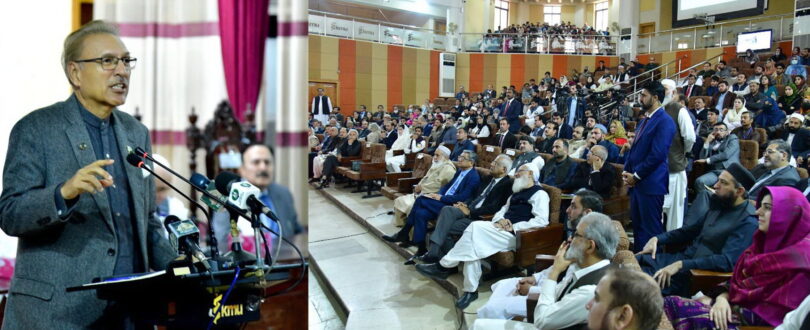F.P. Report
PESHAWAR: President Dr. Arif Alvi has said that in order to set up a healthy and balanced society, walking more and more, using stairs up to two or three floors instead of a lift, and consumption of fresh vegetables and fruits instead of a simple diet, excessive use of salt and sugar in food should be preferred to avoid Non-communicable diseases (NCDs). The increasing risk of NCDs and mortality ratio can be countered through a balanced diet and moderate exercise. The only sustainable solution to the growing number of diseases especially NCDs in poor countries with low education ratios like Pakistan is prevention.
He was addressing the closing session of the 3rd International Public Health Conference at Khyber Medical University (KMU) Peshawar as a chief guest, while Governor Khyber Pakhtunkhwa Haji Ghulam Ali, Chief Minister Azam Khan, Advisor for Health Prof. Dr. Abid Jamil, vice -chancellor Prof. Dr. Zia ul Haq, Registrar Prof. Dr. Muhammad Salim Gandapur, Secretary Health, DG Health, deans, heads of various institutions, foreign delegates, faculty, medical experts and students were also present in large numbers on the occasion.
Dr. Arif Alvi said that while making any policy and strategy related to health, especially NCDs, we must keep social and societal needs, problems, and attitudes in mind. He said that women have a fundamental and key role in bringing up children. The complex health problems faced by the entire nation can be controlled to a great extent by proper training in public health. He said that we have no shortage of policies; the real problem is the implementation of these policies.
Dr. Arif Alvi said that there are 9 million births in Pakistan every year, half of which are involuntary, through proper planning, information, and provision of facilities not only the increasing population can be controlled, but through this, it is also possible to solve the health problems of women and children. He said that nature has blessed us as a nation with immense abilities, but due to the lack of proper use of these resources and abilities, we have lagged behind our neighboring countries in the race for development in every field of life. Our political leadership instead of paying attention to social and public health issues they are caught in personal interests and political disputes, which is of course a matter of concern for all of us.
Dr. Arif Alvi said that instead of giving separate training to doctors regarding the prevention of NCDs they should be trained in the importance and practical methods of prevention of these infectious diseases during their medical education. He emphasized that we should give priority to connecting our new generation with society and making them feel and understand the social problems. He said that the success of the Covid crisis is a good model for us, resulting in the least human and economic loss of Pakistan in this outbreak. This model can also be applied to dealing with NCDs. 24% of our population is suffering from mental diseases, and 60-80% of students are under mental stress, one of the major causes of the mental stress along with many other factors is financial problems which is a big challenge for all of us to deal with, he said.
“We need 900,000 nurses now, while there are only 200,000 nurses in the country, it will take us 50 years to reach the target of 900,000. Similarly, only 1900 psychiatrists are available for 220 million populations in the whole country, we need to move towards an online health system keeping in mind the modern needs and financial constraints,” he added.
The President said that brain drain is an important issue in Pakistan; our valuable capital is being transferred abroad in the form of doctors and other professionals. While on the other hand, ignoring the principles of health, a large number of people are suffering from obesity, diabetes, and heart and mental diseases. Earlier, The KMU vice-chancellor Prof. Dr. Zia ul Haq welcomed the guests while addressing the conference, he also highlighted the fifteen-year performance of the university and presented the objectives and recommendations of the conference, while Prof. Dr. Abdul Basit talked about the causes and prevention of diabetes and Prof. Dr. Samin Siddiqui discussed the situation and challenges of NCDs in Pakistan.







